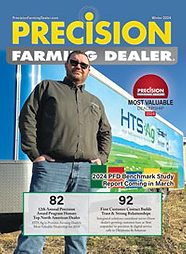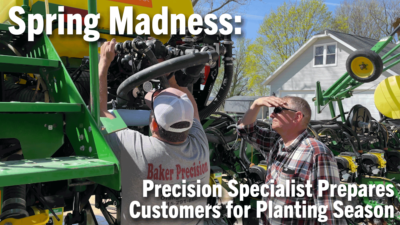Terry Brase’s precision ag program combines education, training and dealer feedback.
Jack Zemlicka, Technology Editor
Precision Agriculture Professor Terry Brase has always loved gadgets.
While teaching a computer class at Hawkeye Community College, in Waterloo, Iowa, in 1993, a colleague gave him his first GPS unit to play with.
After creating a few maps, Brase — who Precision Farming Dealer caught up with recently at the International Precision Ag Conference in Indianapolis — says he came to a logical conclusion about where the technology would prove particularly useful.
“It was exciting to get my hands on a GPS unit and I told my civil engineering friend that this stuff is going to be used in agriculture someday,” Brase says.
Flash forward nearly 20 years and GPS is one of the most widely adopted precision farming tools on the market. But Brase says initially, there was much more confusion than confidence on the part of dealerships that wanted to sell the technology.
“There was a lot of bad information about what the technology could do,” he says. “People were being hired by companies to be their precision farming manager and had no clue about what was going on because there was no training. There was no education at all.”
So Brase helped launch a two-year degree program focused specifically on precision farming technology. A grant from the National Science Foundation got the program started at Hawkeye in 1999 and shortly thereafter, it followed Brase to Kirkwood Community College, in Cedar Rapids, Iowa, where he has been an Agriculture Geospatial Technology professor for the last 13 years.
The current program offers two tracks — one focused on agronomy — and the other geared toward graduates looking to land jobs as precision ag specialists with equipment dealerships.
The core of the dealer-centric program is an intense combination of math, chemistry and ag spatial analysis, designed to equip students with a precision farming foundation.
From there, Brase says students can decide what they want to focus on, but that always includes getting “hands-on” experience with precision equipment. Kinze Manufacturing provides a planter each year that the ag mechanics students assemble and then Brase’s students step in and install the precision equipment.
“They put on the auto-guidance system, air clutches, the hydraulic drives and the air harnesses — all the technology,” he says. “I tell them what it’s supposed to look like at the end and give them the manuals. They are responsible for doing the rest.”
With precision farming technology evolving at a rapid rate, Brase acknowledges that he doesn’t have the budget to cover every type of system being applied to equipment.
But he keeps an open dialogue with dealers to find out what types of education they want in a new hire. Each semester Brase places students in internships with dealerships and conducts weekly interviews with supervisors to solicit feedback.
“There are still a lot of cases where they say, ‘They are learning and catching up,’” Brase says, “but I’ll also hear things like, ‘You need to teach more about electronics or telemetry.’”
Those are two areas where Brase says he is beefing up the curriculum. This fall, he is integrating a multi-meter certification course where students will do in-field measurements of voltage and amperage, then troubleshoot electrical pathways to include data flow from precision hardware.
He is also planning to expand his course offerings to incorporate more telematic exposure — a critical component in the future of precision farming — to dealership-bound students.
“We do a little bit of it with training on RTK base stations and radio frequency technology,” Brase says. “I don’t have the equipment to do the fully-connected farm, but our students get a chance to at least understand the technology and it’s an aspect I am slowly building up in the program.”
Brase says precision manufacturers are generally good about getting the latest technology into his hands before it hits stores. This, he says, allows him to tinker with products prior to introducing them to students.
“Having a good relationship with those in the industry is important,” he says. “That allows me to make sure that when students are hired by dealerships, they can hit the road running or at least get thrown in with the wolves.”






Post a comment
Report Abusive Comment